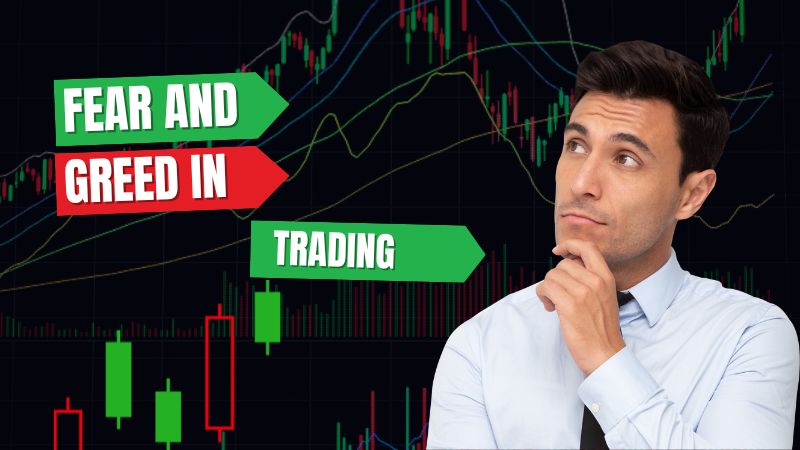
Unlocking the Secrets of Technical Analysis Indicators
September 2, 2024
Automated Trading Systems: Revolutionizing the Financial Markets
September 4, 2024Fear and Greed in Trading

fear and GREED IN TRADING
Introduction to Fear and Greed in Trading
Fear and greed are the primary emotions driving decision-making in financial markets. These powerful emotions can lead to irrational decisions, often resulting in significant economic losses or missed opportunities. But why do these emotions play such a crucial role in trading, and how can you manage them effectively?
What Is Fear in Trading?
Fear in trading refers to the anxiety or apprehension that traders feel when they perceive a risk of loss. This emotion can cause traders to act irrationally, such as selling assets at the first sign of trouble or avoiding trades altogether due to fear of the unknown.
Understanding the Role of Fear
Fear often arises when there is uncertainty in the market. For instance, a sudden economic downturn, unexpected geopolitical events, or a major financial scandal can trigger fear among investors, leading to panic selling or overly cautious behavior.
Common Triggers of Fear in the Market
- Market Volatility: Sudden fluctuations in stock prices can cause fear, especially among inexperienced traders.
- Negative News: Bad news related to a particular sector, company, or the global economy can trigger fear-driven sell-offs.
- Past Experiences: Previous financial losses can instill a fear of repeating the same mistakes, leading to overly conservative strategies.
Examples of Fear in Trading
Panic Selling
Panic selling occurs when traders rapidly sell off their assets in response to a sharp market decline, often driven by fear of further losses. This behavior can exacerbate market downturns, creating a vicious cycle of fear and selling.
Overreaction to Market News
Traders often overreact to market news, such as earnings reports or economic data. Even minor negative news can cause fear, leading to hasty decisions that may not align with the trader’s long-term strategy.
What Is Greed in Trading?
Greed in trading is the excessive desire for profit. It often leads traders to make high-risk decisions, such as holding onto winning trades for too long or overleveraging their positions, in the hope of maximizing returns.
Defining Greed in Financial Markets
Greed can manifest as a refusal to take profits, constantly chasing after the next big win, or ignoring risk management rules. This emotion is driven by the belief that the market will continue to move in a favorable direction indefinitely.
The Psychological Impact of Greed
Greed can cloud judgment and lead to impulsive decision-making. Traders may ignore warning signs, take unnecessary risks, and eventually face significant losses due to overconfidence in their strategies.
Examples of Greed in Trading
Overleveraging Positions
Overleveraging is a common manifestation of greed, where traders borrow more money than they can afford to lose to amplify potential returns. While this can result in substantial profits, it also increases the risk of catastrophic losses.
Chasing Unrealistic Returns
Greedy traders often set unrealistic profit targets and chase after them without considering the risks. This behavior can lead to impulsive decisions and significant financial setbacks.
The Psychological Basis of Fear and Greed
Emotional vs. Rational Decision Making
Fear and greed are emotional responses, while successful trading often requires rational decision-making. Traders need to recognize these emotions and strive to make decisions based on data and analysis rather than feelings.
The Role of Cognitive Biases
Cognitive biases like loss aversion, confirmation bias, and overconfidence can amplify the effects of fear and greed, making it harder for traders to think clearly and objectively.
How Fear and Greed Affect Market Behavior
Market Volatility and Investor Sentiment
Fear and greed can cause significant market volatility. When fear dominates, prices tend to fall as traders sell off assets. Conversely, when greed is prevalent, prices can skyrocket due to speculative buying.
Impact on Stock Prices and Trends
These emotions drive herd behavior, where traders follow the crowd rather than their analysis. This can lead to overvalued or undervalued stock prices and unpredictable market trends.
The Cycle of Fear and Greed in the Market
The Boom and Bust Cycle
The market often moves in cycles driven by fear and greed. During a boom, greed drives prices higher, often beyond intrinsic value. Eventually, fear takes over, causing a market correction or crash.
Case Studies: Historical Market Crashes
Examples like the Dot-com Bubble of the early 2000s and the 2008 Financial Crisis illustrate how fear and greed can lead to dramatic market shifts.
Tools to Manage Fear in Trading
Mindfulness and Emotional Regulation
Mindfulness techniques, such as meditation and breathing exercises, can help traders stay calm and make rational decisions, even in volatile markets.
Setting Stop Losses
Stop losses are predefined points at which a trade will automatically close to prevent further losses. This strategy helps mitigate fear-driven decisions.
Strategies to Control Greed in Trading
Diversification of Investments
Diversifying investments across different asset classes can help mitigate the risk associated with greed-driven decisions.
Practicing Patience and Discipline
Successful traders practice patience and stick to their trading plan, avoiding impulsive decisions driven by greed.
Balancing Fear and Greed for Successful Trading
Developing a Trading Plan
A well-defined trading plan includes risk management strategies and clear entry and exit points. This helps traders stay disciplined and reduce emotional trading.
The Importance of Research and Analysis
Thorough research and analysis are critical to making informed decisions and minimizing the influence of fear and greed.
The Role of Professional Guidance
Working with Financial Advisors
Financial advisors can provide objective insights and help traders stay on track with their investment goals, reducing emotional decision-making.
Leveraging Technology for Better Decision-Making
Utilizing tools like algorithmic trading and market analysis software can help minimize emotional bias and enhance trading strategies.
How Fear and Greed Influence Beginner Traders
Common Mistakes Made by New Traders
Beginner traders are particularly susceptible to fear and greed, often making mistakes like panic selling or chasing high-risk investments.
Tips for Avoiding Emotional Trading
New traders should focus on education, practice discipline, and start with a demo account to avoid letting emotions dictate their decisions.
Conclusion: Embracing Emotional Intelligence in Trading
Mastering fear and greed is essential for becoming a successful trader. By understanding these emotions and implementing strategies to manage them, traders can make more informed decisions, minimize losses, and achieve long-term financial success.
FAQs
- What Is the Best Way to Manage Fear in Trading?
Utilizing tools like stopping losses and practicing mindfulness can help traders manage fear effectively. - How Can Greed Lead to Losses in Trading?
Greed often leads to overleveraging and chasing unrealistic returns, which can result in significant financial setbacks. - Are There Tools to Measure Fear and Greed in the Market?
Yes, tools like the Fear and Greed Index can provide insights into market sentiment. - Can Professional Advice Help Control Emotions in Trading?
Yes, professional advice can offer objective perspectives and reduce emotional decision-making. - Why Is Emotional Control Important for Long-Term Trading Success?
Emotional control prevents irrational decisions, helping traders stick to their strategies and achieve consistent results.



